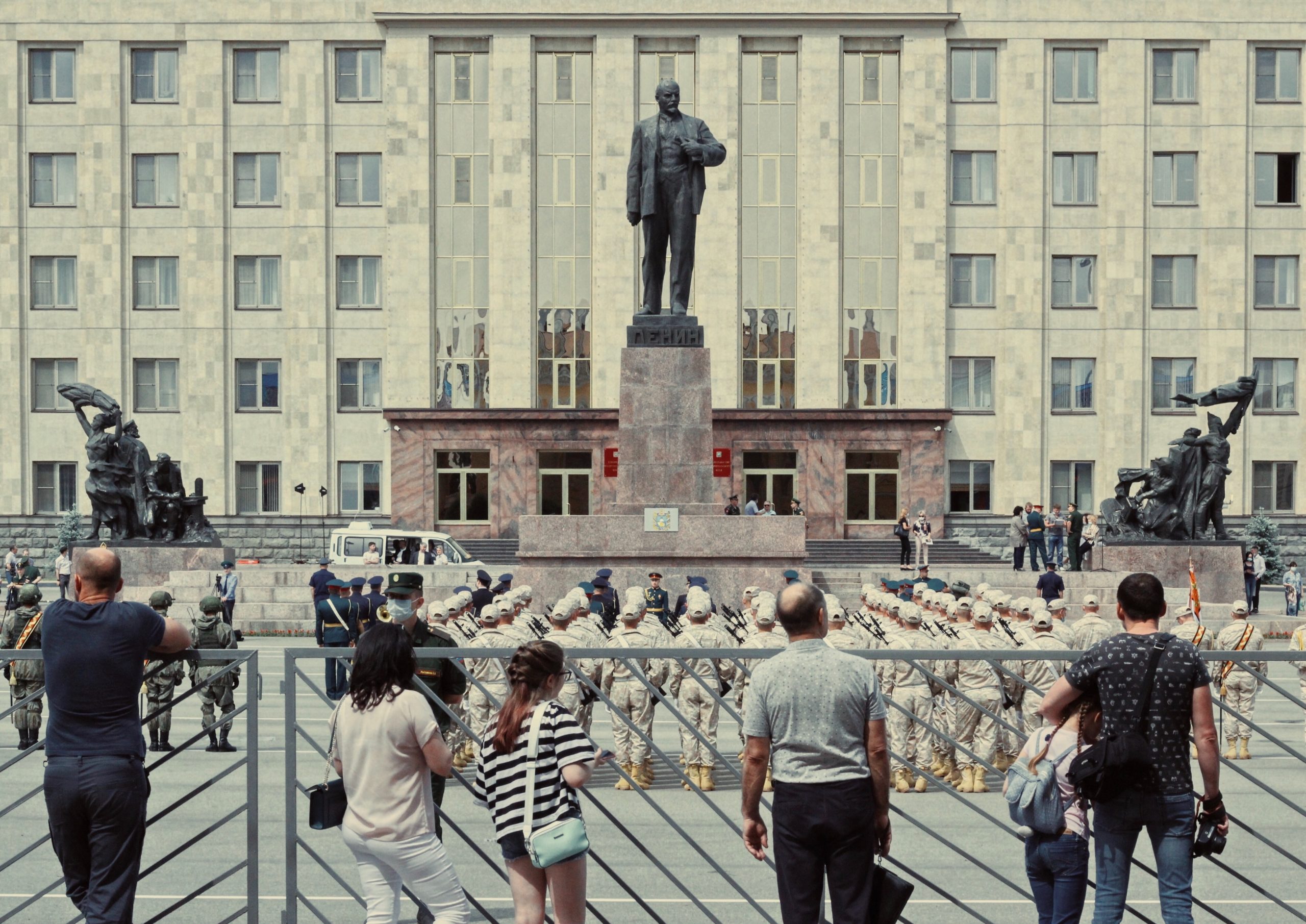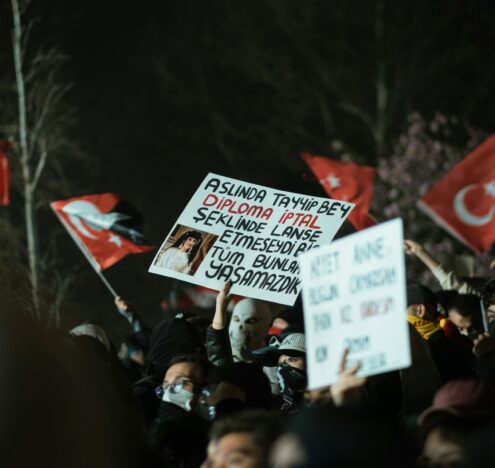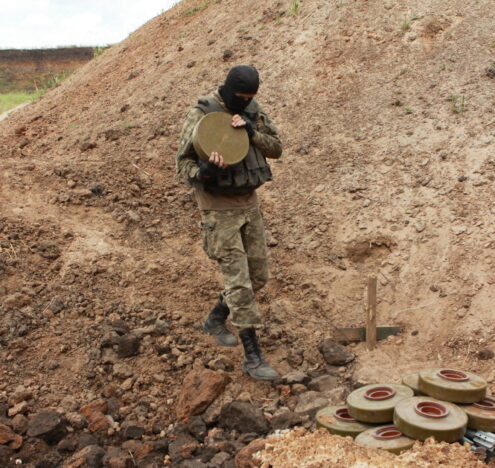Russian President Vladimir Putin has a vast array of disinformation devices at work at home and abroad. Perhaps the biggest source of disinformation: His own words. Only a few short weeks ago, Putin proclaimed the West was exaggerating the threats of military training exercises in Belarus or the pincer-like grip of his troops advancing on Ukraine’s borders. He met with world leaders in a false display of diplomacy. But with his invasion of Ukraine today, he is upping the ante to convince people in Russia and abroad that Russia is in the right.
Earlier this month, an increasing number of videos appeared on social media and Russian state outlets, supposedly showing Ukrainian aggression on the border. The online investigative site Bellingcat has been tracking and debunking these videos. For example, one video promoted by Russia’s Federal Security Service circulating on Twitter shows the shelling of a border post by Ukrainian forces. Bellingcat says this video appears to be filmed at the same location as several others, and the location and images appear to be staged. For Putin’s purposes, however, the video and other similar disinformation efforts support his decision to “demilitarize” Ukraine.
As we watch the invasion unfold on social media and otherwise, we all must be careful about what is real and what is not. In other words, make sure you fact-check your answer.
The narrative is repeated domestically and abroad. Russian state-controlled RT has specifically been called out by Western governments for promoting propaganda, and now faces an outright ban in the UK. A recent RT feature implied that the US and EU were responsible for the 2014 protests that led to the current crisis. Sympathetic publications repeat Russian headlines. For example, in Serbia this week a leading tabloid proclaimed “Ukraine attacked Russia!“ And in a replay of the Russian 2016 and 2020 election disinformation campaigns in the US, pseudo media organizations are targeting right-wing US media outlets with false information. One repeat offender is the now EU-sanctioned Internet Research Agency, financed by Yevgeny Prigozhin, which was also called out in a 2018 US Department of Justice indictment for interfering with US elections by operating “social media pages and groups designed to attract US audiences.” Prigozhin is sanctioned for “deployment of Wagner Group mercenaries in Ukraine and for benefitting from large public contracts with the Russian Ministry of Defense following the illegal annexation of Crimea by Russia and occupation of Eastern Ukraine by Russia-backed separatists.” The US State Department has also called out RT and Sputnik for their role in Russia’s “propaganda ecosystem.”
COUNTERING PUTIN’S ALTERNATIVE REALITY
Disturbing narratives of neo-Nazis in Ukraine, the genocide of ethnic Russians in Donbas (Russian officials have even gone so far as to say that they have found mass graves), and Ukraine’s nuclear threat are all gaining traction. Putin’s repetition of these allegations is creating an alternate reality. It is a reality he served up since his 2014 annexation of Ukraine’s Crimea — the biggest land-grab in Europe since World War II at the time, and also conducted right after the Winter Olympics wrapped up. Then — as now — Putin claimed historic “ownership” over Crimea and expressed concerns that ethnic Russians were being mistreated. Then — as now — he expressed security concerns over Ukraine getting closer to NATO. A limp response from the West encouraged him to keep a fighting presence in eastern Ukraine, where he warred on Ukraine for the past eight years.
Will this alternate reality reign along with the systemic dissolution of Ukraine? Certainly, in his inner circle, where dissent is not tolerated, the idea of Putin as a historical hero dominates. For example, Maria Zakharova, spokeswoman for the Russian Foreign Ministry, responded to the canceled diplomatic talks after Russia’s invasion of Ukraine with the following statement:
“Today, on this very day, the official Russian delegation, headed by Russian Foreign Minister Sergei Lavrov, was supposed to be in Europe. Europe keeps making all kinds of accusations against us. The Russian delegation was supposed to be there for talks with their US counterparts headed by the US Secretary of State Mr. Blinken … it was the American side that refused to conduct further negotiations.”
The West has been trying to aggressively counter disinformation with transparency. The Biden administration has shared information from intelligence reports and satellite images have shown troop positions and tactical bridges being built. Fact-checking outlets are challenging Russian government claims and sharing information widely. Kremlin Watch is one EU organization confronting Russia’s disinformation campaigns, but both independent nonprofits like Poynter’s Politifact and in-house media fact-checkers like AFPs Factcheck are on high alert.
Social media companies are seemingly more prepared to counter disinformation but specific actions have not yet been taken to label misleading posts or even take them down — if we want to take them down that is. The Russian videos described above may be needed by archivists and activists to hold Russia accountable for fabricating the pretext of war. No clear resolution to this problem has yet been found and opens up a host of future questions about who writes history and who erases it.
Speaking of erasure, as I write, reports are in that the Kremlin website and most Russian government websites are down. Are Ukrainian rebels attacking Russian sites as cyber-based political activism against Russia (as I talked about in my latest Doorstep podcast with cybersecurity expert Joseph Marks for Carnegie Council for International Affairs), which is similar to what happened in Belarus earlier this year? Or is this state-sanctioned and a preview of cyber warfare by the EU or US?
More importantly, as we watch the invasion unfold on social media and otherwise, we all must be careful about what is real and what is not. Check your source, confirm the information with at least one other credible outlet, and share only if you can confirm the first two. In other words, make sure you fact-check your answer.
Tatiana Serafin teaches journalism at Marymount Manhattan College and is a Senior Fellow at the Carnegie Council for Ethics in International Affairs where she co-hosts The Doorstep podcast.




















